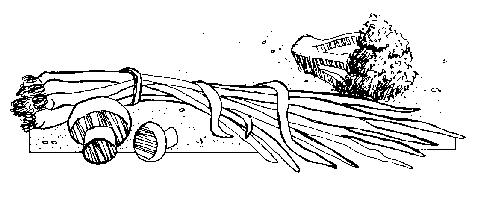
| Contents | Start | Previous | Next |
As your effort grows, you can organize and sponsor special events that will attract more people to join in the work and the fun. Examples of these kinds of events are concerts, poetry readings, rallies, lectures, and film festivals. Before these events, be sure to call all the press listed in the yellow pages for your town and invite them to come. Even though the coverage can sometimes be unsympathetic, it is still valuable to have Food Not Bombs mentioned in the press. In our experience, most people understand the concept "food not bombs" and are not misled by negative reporting.
At these events, a special attention-grabber is the display of a huge
banner proclaiming "Food Not Bombs." This banner is very useful when the
media take pictures because, if nothing else, the words "Food Not Bombs"
will be displayed. You can also use the Food Not Bombs logo of a purple
fist holding a carrot as much as you want. Our national office has buttons,
bumper stickers, t-shirts, and banners with this logo for you to use in
fund-raising and promotion.
(See National Contact List in the appendix.)
Food Collection
Food recovery is the backbone of the Food Not Bombs operation. Discovering sources of surplus food might at first appear to be a major challenge, but mostly, it just takes confidence and patience. Every business in the food industry is a potential source of recoverable food, from wholesale to retail, and from production to distribution. Sometimes it may take some creativity and persistence to convince a stubborn manager to allow you to have some "waste" food, but, in most instances, the businesses will be very cooperative.
You will need to decide if you want the business owners or managers to know that some of the food will be used for political organizing or the name of your group, Food Not Bombs. At some stores, this will not be an issue; at others, it might be better left unsaid until they get to know you better.
Start by making arrangements to collect food at organic produce warehouses, bakeries, and natural food stores. Ask the workers at these businesses if they have any edible food that they regularly throw away and, if so, that they would be willing to give to you. Be sure to point out that by collecting this food, you will be saving them money on their waste disposal bill. They will certainly be aware of how expensive it is to have this surplus hauled away as waste and of how costs keep growing each year as more and more landfills become exhausted. One of the by-products of our program is the reduction of waste in our society.
While in the process of collecting contacts in the food industry, you should also be determining the availability of drivers and vehicles. There needs to be at least one volunteer to drive each day. Make a schedule convenient to both store and driver. It is important to be flexible but also reliable: businesses will hesitate to agree if they do not feel they can rely on this "waste" removal method on a regular basis. It is a tradition with Food Not Bombs to always be on time; therefore, do not overextend yourself. It is actually more common to get too much food than not enough; but only do as much as is comfortable. After all, some recovery of food is better than no recovery at all.
Also, take time to make friends with the workers at the sites where
food is collected. These workers make the day-to-day decisions abouthow
much food is recovered, and they can make an effort to recover even more
if they feel comfortable with you.

| Contents | Start | Previous | Next |